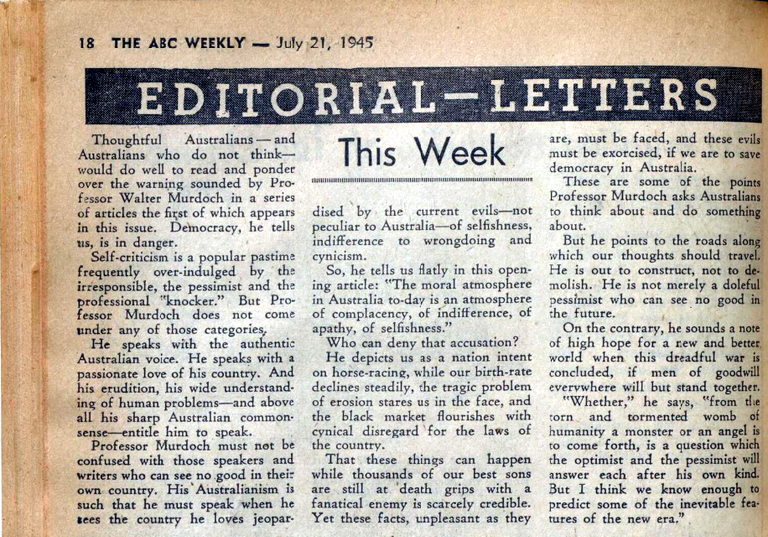Blueprint For A Nation by Prof. Walter Murdoch - Editorial
Blueprint For A Nation - Introductory Editorial in The ABC Weekly, 1945
A series of three articles written by Professor W. Murdoch (Chancellor of the University of Western Australia) on the nature of Australia and its future relations to Democracy. These three articles and an introductory editorial were published in The ABC Weekly Journal way back in 1945.
- Blueprint For A Nation by Prof. Walter Murdoch - Editorial
- Blueprint For A Nation by Prof. Walter Murdoch - 1st Article
- Blueprint For A Nation by Prof. Walter Murdoch - 2nd Article
- Blueprint For A Nation by Prof. Walter Murdoch - 3rd Article

Editorial - Letters
This Week
(July 21, 1945 - The ABC Weekly)
Thoughtful Australians — and Australians who do not think — would do well to read and ponder over the warning sounded by Professor Walter Murdoch in a series of articles the first of which appears in this issue. Democracy, he tells us, is in danger.
Self-criticism is a popular pastime frequently over-indulged by the irresponsible, the pessimist and the professional “knocker.” But Professor Murdoch does not come under any of those categories.
He speaks with the authentic Australian voice. He speaks with a passionate love of his country. And his erudition, his wide understanding of human problems —and above all his sharp Australian commonsense — entitle him to speak.
Professor Murdoch must not be confused with those speakers and writers who can see no good in their own country. His Australianism is such that he must speak when he sees the country he loves jeopardized by the current evils — not peculiar to Australia — of selfishness, indifference to wrongdoing and cynicism.
So, he tells us flatly in this opening article: “The moral atmosphere in Australia today is an atmosphere of complacency, of indifference, of apathy, of selfishness.”
Who can deny that accusation?
He depicts us as a nation intent on horse-racing, while our birth-rate declines steadily, the tragic problem of erosion stares us in the face, and the black market flourishes with cynical disregard for the laws of the country.
That these things can happen while thousands of our best sons are still at death grips with a fanatical enemy is scarcely credible. Yet these facts, unpleasant as they are, must be faced, and these evils must be exorcised, if we are to save democracy in Australia.
These are some of the points Professor Murdoch asks Australians to think about and do something about.
But he points to the roads along which our thoughts should travel. He is out to construct, not to demolish. He is not merely a doleful pessimist who can see no good in the future.
On the contrary, he sounds a note of high hope for a new and better world when this dreadful war is concluded, if men of goodwill everywhere will but stand together.
“Whether,” he says, “from the torn and tormented womb of humanity a monster or an angel is to come forth is a question which the optimist and the pessimist will
answer each after his own kind. But I think we know enough to predict some of the inevitable features of the new era.”